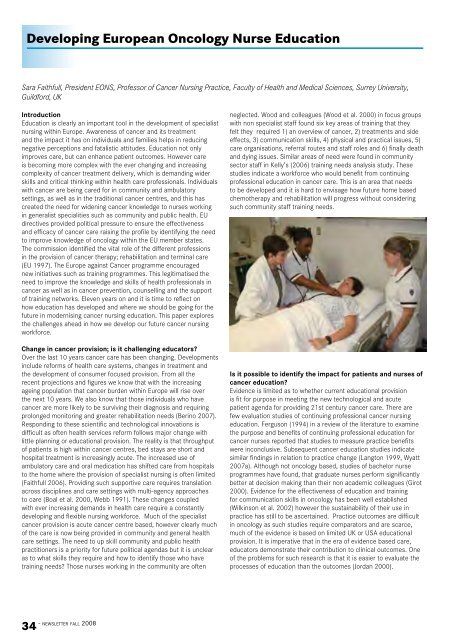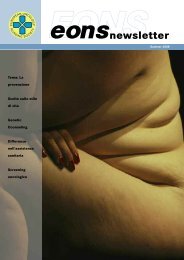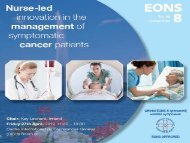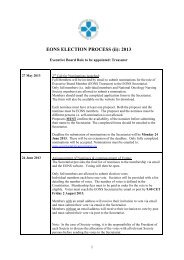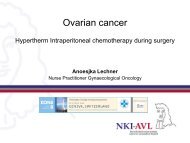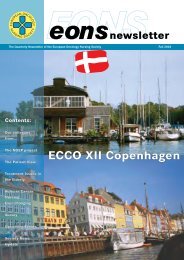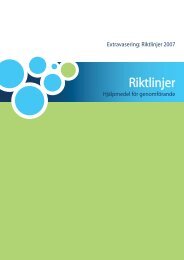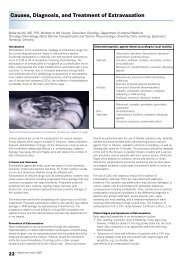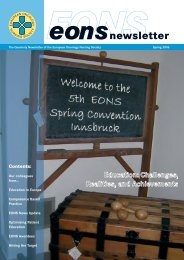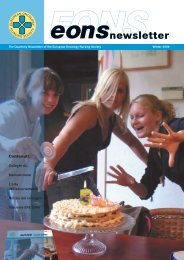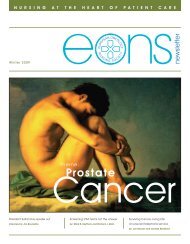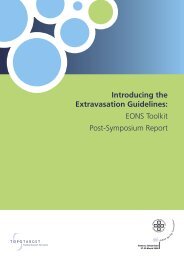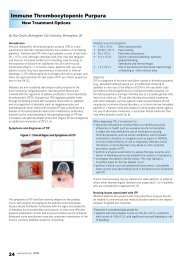Developing <strong>European</strong> <strong>Oncology</strong> Nurse EducationSara Faithfull, President EONS, Professor of Cancer <strong>Nursing</strong> Practice, Faculty of Health and Medical Sciences, Surrey University,Guildford, UKIntroductionneglected. Wood and colleagues (Wood et al. 2000) in focus groupsEducation is clearly an important tool in <strong>the</strong> development of specialist with non specialist staff found six key areas of training that <strong>the</strong>ynursing within Europe. Awareness of cancer and its treatment felt <strong>the</strong>y required 1) an overview of cancer, 2) treatments and sideand <strong>the</strong> impact it has on individuals and families helps in reducing effects, 3) communication skills, 4) physical and practical issues, 5)negative perceptions and fatalistic attitudes. Education not only care organisations, referral routes and staff roles and 6) finally deathimproves care, but can enhance patient outcomes. However care and dying issues. Similar areas of need were found in communityis becoming more complex with <strong>the</strong> ever changing and increasing sector staff in Kelly’s (2006) training needs analysis study. Thesecomplexity of cancer treatment delivery, which is demanding wider studies indicate a workforce who would benefit from continuingskills and critical thinking within health care professionals. Individuals professional education in cancer care. This is an area that needswith cancer are being cared for in community and ambulatory to be developed and it is hard to envisage how future home basedsettings, as well as in <strong>the</strong> traditional cancer centres, and this has chemo<strong>the</strong>rapy and rehabilitation will progress without consideringcreated <strong>the</strong> need for widening cancer knowledge to nurses working such community staff training needs.in generalist specialities such as community and public health. EUdirectives provided political pressure to ensure <strong>the</strong> effectivenessand efficacy of cancer care raising <strong>the</strong> profile by identifying <strong>the</strong> needto improve knowledge of oncology within <strong>the</strong> EU member states.The commission identified <strong>the</strong> vital role of <strong>the</strong> different professionsin <strong>the</strong> provision of cancer <strong>the</strong>rapy; rehabilitation and terminal care(EU 1997). The Europe against Cancer programme encouragednew initiatives such as training programmes. This legitimatised <strong>the</strong>need to improve <strong>the</strong> knowledge and skills of health professionals incancer as well as in cancer prevention, counselling and <strong>the</strong> supportof training networks. Eleven years on and it is time to reflect onhow education has developed and where we should be going for <strong>the</strong>future in modernising cancer nursing education. This paper explores<strong>the</strong> challenges ahead in how we develop our future cancer nursingworkforce.Change in cancer provision; is it challenging educators?Over <strong>the</strong> last 10 years cancer care has been changing. Developmentsinclude reforms of health care systems, changes in treatment and<strong>the</strong> development of consumer focused provision. From all <strong>the</strong> Is it possible to identify <strong>the</strong> impact for patients and nurses ofrecent projections and figures we know that with <strong>the</strong> increasing cancer education?ageing population that cancer burden within Europe will rise over Evidence is limited as to whe<strong>the</strong>r current educational provision<strong>the</strong> next 10 years. We also know that those individuals who have is fit for purpose in meeting <strong>the</strong> new technological and acutecancer are more likely to be surviving <strong>the</strong>ir diagnosis and requiring patient agenda for providing 21st century cancer care. There areprolonged monitoring and greater rehabilitation needs (Berino 2007). few evaluation studies of continuing professional cancer nursingResponding to <strong>the</strong>se scientific and technological innovations is education. Ferguson (1994) in a review of <strong>the</strong> literature to examinedifficult as often health services reform follows major change with <strong>the</strong> purpose and benefits of continuing professional education forlittle planning or educational provision. The reality is that throughput cancer nurses reported that studies to measure practice benefitsof patients is high within cancer centres, bed stays are short and were inconclusive. Subsequent cancer education studies indicatehospital treatment is increasingly acute. The increased use of similar findings in relation to practice change (Langton 1999, Wyattambulatory care and oral medication has shifted care from hospitals 2007a). Although not oncology based, studies of bachelor nurseto <strong>the</strong> home where <strong>the</strong> provision of specialist nursing is often limited programmes have found, that graduate nurses perform significantly(Faithfull 2006). Providing such supportive care requires translation better at decision making than <strong>the</strong>ir non academic colleagues (Girotacross disciplines and care settings with multi-agency approaches 2000). Evidence for <strong>the</strong> effectiveness of education and trainingto care (Boal et al. 2000, Webb 1991). These changes coupled for communication skills in oncology has been well establishedwith ever increasing demands in health care require a constantly (Wilkinson et al. 2002) however <strong>the</strong> sustainability of <strong>the</strong>ir use indeveloping and flexible nursing workforce. Much of <strong>the</strong> specialist practice has still to be ascertained. Practice outcomes are difficultcancer provision is acute cancer centre based, however clearly much in oncology as such studies require comparators and are scarce,of <strong>the</strong> care is now being provided in community and general health much of <strong>the</strong> evidence is based on limited UK or USA educationalcare settings. The need to up skill community and public health provision. It is imperative that in <strong>the</strong> era of evidence based care,practitioners is a priority for future political agendas but it is unclear educators demonstrate <strong>the</strong>ir contribution to clinical outcomes. Oneas to what skills <strong>the</strong>y require and how to identify those who have of <strong>the</strong> problems for such research is that it is easier to evaluate <strong>the</strong>training needs? Those nurses working in <strong>the</strong> community are often processes of education than <strong>the</strong> outcomes (Jordan 2000).34 - newsletter fall 2008
It is not surprising that process evaluations of nurses practiceperceptions has been <strong>the</strong> most common way of evaluating <strong>the</strong>impact of continuing professional education. Studies of <strong>the</strong> nurses<strong>the</strong>mselves indicate that continuing professional education improvesconfidence, communication skills and decreases anxiety (Copp etal. 2007) it also has a perceived impact on practice (Wyatt (2007b,Pelletier et al 2004, Steginga et al 2005). A study of a UK healthprovider found that nurses’ perceptions of training needs are oftendifferent from that of health managers and that curriculum contentwas often generic and not adapted to reflect cultural characteristicsof <strong>the</strong> local health population and health economy (Kelly et al 2006).The wide variation in continuing educational provision has beenseen in specific courses such as in chemo<strong>the</strong>rapy administrationand training with some nurses receiving minimal education in <strong>the</strong>underpinnings of knowledge required for safe chemo<strong>the</strong>rapy practice(Verity R et al 2008).Clearly saying is not <strong>the</strong> same as doing?Developing both processand outcome evaluationof continuing professionaleducation is requiredwithin Europe with aneed to look at specificcancer nursing skill setsand comparator groups.Proving <strong>the</strong> “value added”nature of educationis essential if we areto develop specialistcancer nursing. As wellas research in this areawe need to identify <strong>the</strong>costs and consequencesof up skilling <strong>the</strong>workforce for healthservice managers andpolicy makers. There is aneed to recognise suchspecialist skills as partof employment providingfinancial incentives and job satisfaction. In many countries <strong>the</strong>re isno recognition of specialist nursing roles and <strong>the</strong>re is little financialincentive or support for <strong>the</strong> development of specialist cancer skills(Foubert & Faithfull 2006). Barriers to education and training are notonly financial <strong>the</strong>y can be time related and reflect accessibility (Wyatt2007a). However effective continuing professional development hasbeen linked with enhanced morale, increased motivation and staffretention so also provides benefits for managers (Smith & Topping2001). Unpacking <strong>the</strong> complexity of <strong>the</strong>se outcomes is essential ifspecialist cancer nursing is to be valued.ConclusionRecognising that <strong>the</strong> developments within education have been quitedramatic in <strong>the</strong> last few years more is being required of educators.Fur<strong>the</strong>rmore increasing financial constraints in education hasmeant that nurses are finding it difficult to get release and fundfur<strong>the</strong>r continuing professional development within many EU clinicalsettings. There is also an increasing need for short more work-basedprogrammes to enhance accessibility. The development of <strong>the</strong> EONSpost basic cancer nursing curriculum has made an impact on learningresources providing a gold standard for educational provision withinEurope but requires evaluation of <strong>the</strong> outcomes that result as part ofthis education. Future development of new specialist curricula andadvancing levels of practice through consensus and expert panelsidentify <strong>the</strong>se curricular as recognised professional education forspecialist cancer nurses. We need more evidence as to <strong>the</strong> valueof specialist education in outcomes that policy makers and heal<strong>the</strong>conomists understand. Providing a trained and skilled workforcewill have benefits not only for nurses <strong>the</strong>mselves but in patientcare. Those in nurse education face many challenges not only in <strong>the</strong>processes of how cancer education is provided and to whom, butalso in redefining <strong>the</strong> skills needed by <strong>the</strong> cancer workforce to clearlyimpact on <strong>the</strong> practice outcomes.References:Berino F et al. (2007) Survival for 8 major cancers: results of <strong>the</strong>Eurocare4 study. Lancet <strong>Oncology</strong> 8(9) 773-783Boal E, Hodgson D, Banks-Howe J, & Husband G (2000) A culturalchange in cancer education and training <strong>European</strong> Journal of <strong>Oncology</strong><strong>Nursing</strong> 9,30-35Copp G, Caldwell K, Atwal A, Brett-Richards M, Coleman K (2007)Preparation for cancer care: perceptions of newly qualified healthcare professionals <strong>European</strong> Journal of <strong>Oncology</strong> <strong>Nursing</strong> 11 159-167<strong>European</strong> Commission (1997) Public Health in Europe employmentand social affairs, EC LuxembourgFaithfull S (2006) E. Milly L. Haagedoorn Lecture EACE 2006.Developing oncology nurse education and training across Europe. JCancer Educ. Winter; 21(4):212-5.Foubert J, Faithfull S (2006) Education in Europe: are cancer nursesready for <strong>the</strong> future? J BUON. 2006 Jul-Sep;11(3):281-4.Ferguson A (1994) Evaluating <strong>the</strong> purpose and benefits of continuingeducation in nursing and <strong>the</strong> implications for <strong>the</strong> provision ofcontinuing education for cancer nurses Journal of Advanced <strong>Nursing</strong>19, 640-646Girot EA (2000) Graduate nurses: critical thinkers or better decisionmakers? Journal of Advanced <strong>Nursing</strong> 31(2) 288-297Jordan S (2000) Educational input and patient outcomes: exploring<strong>the</strong> gap Journal of Advanced <strong>Nursing</strong> 31 (2) 461-471Kelly D, Gould D, White I, Burridge EJ (2006) Modernising cancer andpalliative care education in <strong>the</strong> UK: insights from one cancer network<strong>European</strong> Journal of <strong>Oncology</strong> <strong>Nursing</strong> 10 187-197Langton H, Blunden G, Hek G (1999) Cancer nursing education:literature review and documentary analysis: <strong>English</strong> National Board for<strong>Nursing</strong>, Midwifery and Health Visiting, LondonPelletier D, Donohue J, Duffield C (2004) Australian nurses’perceptions of <strong>the</strong> impact of <strong>the</strong>ir postgraduate studies on <strong>the</strong>irpatient care activities. Nurse Education Today 23 434-442Smith J & Topping A (2001) Unpacking <strong>the</strong> ‘value added’ impactof continuing professional education: a multi-method case studyapproach Nurse Education Today 21 341-349Steginga SK, Dunn J, Dewar AM, McCarthy A, Yates P, Beadle G.(2005) Impact of an intensive nursing education course on nurses’knowledge, confidence, attitudes, and perceived skills in <strong>the</strong> care ofpatients with cancer. Oncol Nurs Forum. Mar 5;32(2):375-81.Webb P, (1991) Educational initiatives for cancer nursing in Europe. JCancer Educ. 6(1):9-14.Wilkinson S, Gambles M, Roberts A (2002) The essence of cancercare: <strong>the</strong> impact of training on nurses’ ability to communicateeffectively Journal of Advanced <strong>Nursing</strong> 40(6) 731-738Wood C & Ward J (2000) A general overview of <strong>the</strong> cancer educationneeds of non-specialist staff. <strong>European</strong> journal of Cancer Care 9191-196Wyatt DE. (2007a) The impact of oncology education on practice--aliterature review.Eur J Oncol Nurs. 2007 Jul; 11(3):255-61.Wyatt D (2007b) How do participants of a post registration oncologynursing course perceive that <strong>the</strong> course influences <strong>the</strong>ir practice? adescriptive study <strong>European</strong> Journal of <strong>Oncology</strong> <strong>Nursing</strong> 11, 168-178Verity R, Wiseman T, Ream E, Teasdale E, Richardson A (2008)Exploring <strong>the</strong> work of nurses who administer chemo<strong>the</strong>rapy <strong>European</strong>Journal of <strong>Oncology</strong> <strong>Nursing</strong> doi:10.1016/j.ejon.2008.02.001newsletter fall 2008 -35


